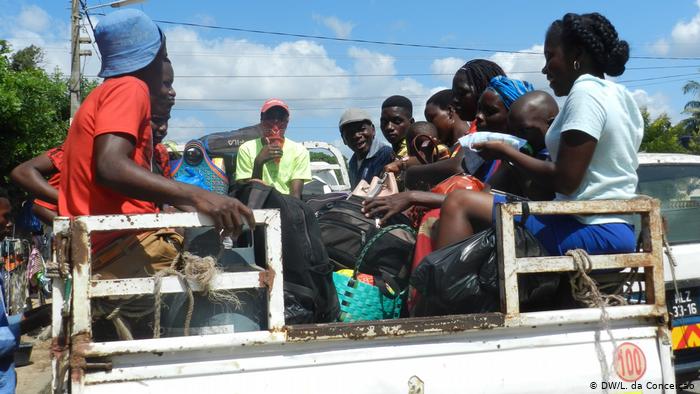Mozambique: "Triple crisis" leaves 5.2 million in need of humanitarian assistance - UN
State of emergency in Inhambane: “There are social gatherings on street corners”

Photo: DW
It is difficult to change people’s habits in the hope of preventing the spread of Covid-19. DW reports on the first day of the state of emergency in Inhambane, southern Mozambique. As of yesterday, the country has ten confirmed coronavirus cases.
On Wednesday (01-04), Mozambique entered a state of emergency aimed at containing the spread of the new coronavirus. In Inhambane, in the south of the country, there was reduced circulation of people on the streets, but changing habits is proving difficult.
Many people refuse to stay at home, and keeping a minimum distance of two meters from other people is practically impossible.
Inhambane resident Francisco Massigue is concerned about the situation, and says that “there is no prevention whatsoever, since there are social gatherings on the [street] corners”.
He says that minibuses, for example, are full because they are not obeying the rules. “They comply at the terminus, but on the way they fill up as if nothing were happening. There is a lot of work to be done and the authorities must apply themselves,” he complains.
Neither people living in urban areas nor those living in the countryside are complying with the recommended measures.
Inhassoro district resident Hélio Clemente calls for more awareness. He stills see people “walking around in groups” and shaking hands. “It could get worse,” he warns.
Information about Covid-19 is lacking
Nelson Almeida, who lives in Maxixe, says that many fellow-citizens have returned from neighbouring South Africa, where a lockdown has been decreed, in the last few days.
“Most of them live in the rural areas, and they don’t understand coronavirus, they don’t have radio and television. They have a lot of difficulty understanding what is happening in the world,” he says.
New response committee in Inhambane
But measures to ensure compliance with the prevention rules have been put in place.
The Inhambane Transport Association’s Wilson Limeme tells DW Africa that ensuring hygiene standards is a priority. Each passenger “must wash his or her hands” with soap and water. Another rule is the limit of three people on each bench seat. “They have already got the communiqué; nobody is complaining,” he says.
Naftal Matuce, spokesman for the Inhambane provincial government, reveals that an Emergency Operative Committee has just been created to respond to the Covid-19 pandemic. Two centres have also been opened to accommodate possible infected people.
Mozambique currently has ten cases of Covid-19 infection, according to the latest figures released this Wednesday (01/04) by health authorities.












Leave a Reply
Be the First to Comment!
You must be logged in to post a comment.
You must be logged in to post a comment.